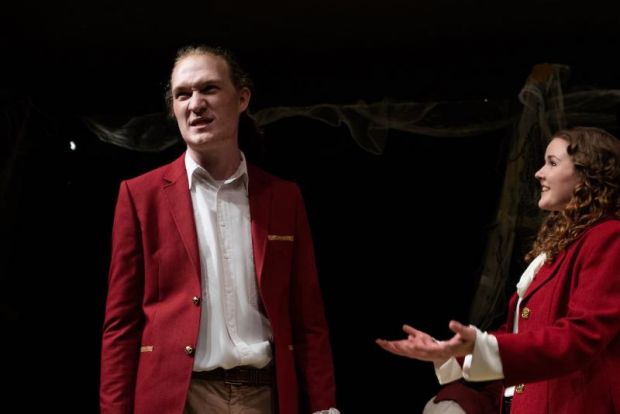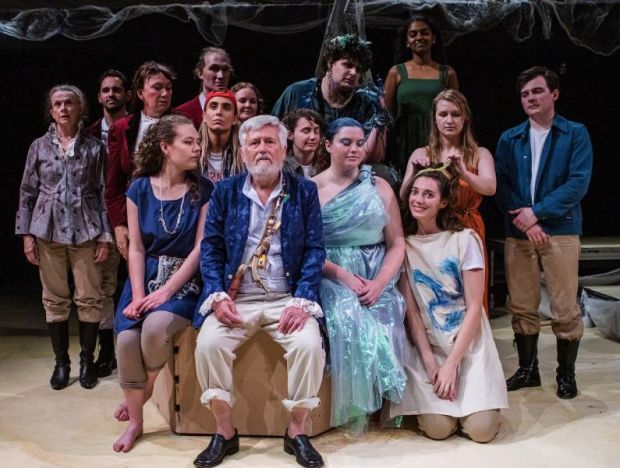The Tempest
Director Bronwyn Palmer has set UATG’s The Tempest on an ‘island of garbage’, referencing The Great Pacific Garbage Patch (known also as the Pacific trash vortex) that spans waters from the West Coast of America to Japan. With detritus fringing the sand-coloured/turquoise bordered Little Theatre stage or netting, garbage bags and other junk hanging from the mezzanine and elsewhere, the clever set is certainly evocative of abandonment and remoteness.

Palmer’s direction of the ensemble is exemplary where movement, meaning and intrinsic relationships are concerned; I also appreciated her detailed approach to movement and gesture. In turn, the actors of this ensemble are focussed and collaborative throughout this demanding production. Use of the Little Theatre’s levels works well as cast enter or exit via audience stairways and surround us with beautifully harmonized songs, or characters address each other from different parts of the theatre. Complementing the action are simple but effective lighting states from Stephen Dean and appropriate but restrained audio-visual design by Mark Wickett (also assistant director) to enhance atmosphere and place.

University of Adelaide Theatre Guild celebrate their eighty-fifth year in 2023 and are an excellent organization dedicated to excellence in theatre and giving opportunities to many young people starting their acting journey, as well as to more established performers. Unfortunately with some of the performances in The Tempest this difference in experience was noticeable. Delivering Shakespeare’s text requires a fine mix of clarity, precision, diction, intention, and emotion and not everyone has reached that apex in their performance. Overall, this production is very enjoyable and does the play justice. However, the pace is much too slow in parts and the differences in energy and talent become more marked. Now and then an actor veers toward being too indulgent with their character’s delivery and the vibrancy ebbs. I suspect as the cast settle into the run, this will improve and nerves should abate.

In the best moments, the synergy was electric and easily drew the audience into the story. As Ariel, Finty McBain’s vocals and movement were a delight and her immersion in the role complete. Bronwyn Ruciak’s dulcet tone and nuanced performance gave Alonso the perfect gravitas while Annie Matsouliadis shone with her precision delivery and verve as Trinculo. Ellie Schaefer imbued Miranda with just the right amount of teenage sass and an innocent’s wonder although her vocal register occasionally ran too shrill and words were lost. Newcomer to theatre John Charles gave Caliban huge energy plus a powerful drive both vocally and physically but again, clarity was an issue at times. With her portrayal of the insidious Antonio, Susan Cilento was subtly manipulative but could have been stronger vocally.

This ensemble has had a fine director to guide them and Palmer’s interpretation of the text is a considered one with various relationships at the core. The costuming hints at an eighteenth century flavour rather than an Elizabethan one but the themes are all there and as always, universal. One of the joys I find in Shakespeare is the relevance of his ideas and motifs to contemporary life, or even politics. Take Richard Loncraine’s 1995 film version of Richard III with Ian McKellen in the titular role and transposed to the 1930s with a fascist bent to the York and Lancaster houses’ rivalry. With The Tempest, we perceive themes of justice and retribution, punishment and forgiveness, and ideas of slavery, bondage, or oppression. There are power struggles, class comparisons, morality ‘lessons’, and a sense of humanity versus the elements and the elementals, and more. All of this has relevance to the world we currently live in with posturing first-world leaders, environmental issues that divide populations, criminal activity on a global scale, and the erosion of morality and ethics. For me, there is also the compound image of Prospero as a masterful but sometimes immoral manipulator, a loving father, a troubled soul, but also architect of his realm and destiny. As his machinations unfold, it is as if the magician is forging the story in front of us. In respect of these complexities I found Jack Robins’ Prospero to have authority but not quite enough dynamism or variation of intensity.

This production conveys the magic and mayhem of The Tempest and will delight audiences as the action ranges from the dramatic to the comedic. It also makes for a terrific, accessible introduction to Shakespeare for those not overly familiar or comfortable with The Bard’s work.
Lisa Lanzi
Photographer: Chris Best
Subscribe to our E-Newsletter, buy our latest print edition or find a Performing Arts book at Book Nook.

